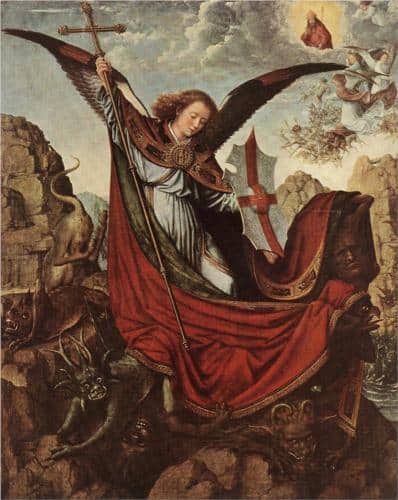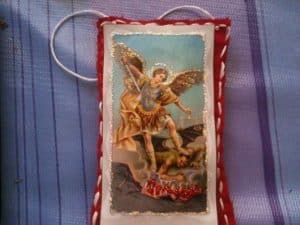Archangel Michael-Who is Like God-Angel of Healing, Protection, and Victory
Dear Miracles,
Archangel Miguel as I have always thought of Him is a potent spiritual ally. One of the four guardian angels of tradition, he is most often petitioned for protecting those who protect others, but his story and his vastness contain so much more than that. Of special interest to me and in my work is Michael’s relationship to women and children — he is sometimes called the Advocate and he certainly has a history of advocating for those two groups. I celebrate his feast day, also known as Michaelmas, on September 29th as all of my Catholic family members have done for oh so long. Please allow me to tell you a bit of the history and story of this most venerated figure.
History
 Archangel Michael is a holy figure in Judaism, Christianity, and Islam. His name means “Like Unto God” or “Who is Like God” In Catholic and Christian Orthodox traditions, he is sometimes known as Saint Michael or Saint Archangel Michael. Catholic and Orthodox traditions venerate him as the patron saint for policemen and soldiers. In Muslim tradition, some believe him to be one of three angels that visited Abraham and he is mentioned once in the Qu’ran. In the Coptic Orthodox Church, he is the one who presents God with the prayers of the people. Other traditions hold that Archangel Michael is actually Adam from the Book of Genesis or that he is the pre-incarnate figure for Christ. Tradition names him as the angel who foretold Mary, Mother of God, of her approaching death.
Archangel Michael is a holy figure in Judaism, Christianity, and Islam. His name means “Like Unto God” or “Who is Like God” In Catholic and Christian Orthodox traditions, he is sometimes known as Saint Michael or Saint Archangel Michael. Catholic and Orthodox traditions venerate him as the patron saint for policemen and soldiers. In Muslim tradition, some believe him to be one of three angels that visited Abraham and he is mentioned once in the Qu’ran. In the Coptic Orthodox Church, he is the one who presents God with the prayers of the people. Other traditions hold that Archangel Michael is actually Adam from the Book of Genesis or that he is the pre-incarnate figure for Christ. Tradition names him as the angel who foretold Mary, Mother of God, of her approaching death.
In Jewish tradition, Archangel Michael is the closest angel to God. He is Captain of God’s army as well as the ruler of all natural elements such as rain, wind, and storms. His nemesis is the Angel Samael. When Samael was cast down from heaven, he grabbed Michael’s wings, hoping to bring him down as well. Some traditions also say that Michael and Samael are in a constant battle over the state of Moses’ soul. In Rabbinic liturgy, Archangel Michael is seen as the staunch defender of Israel. His depiction in the Book of Daniel as “a great prince who stands up for the children of your people” led to a place for him in Jewish liturgy despite Rabbinical prohibitions against seeking the intercession of angels between men and God. Due to Michael’s role as a defender of Jews and Israel, two Jewish prayers are specifically recited in his honor.
In the early Christian tradition, shrines and sanctuaries were dedicated to Michael. Though he is mentioned as leading God’s army against Satan in the Book of Revelation, these early Christian shrines and sanctuaries dedicated to Archangel Michael were actually for the purpose of healing. Saints like George were considered martial whereas Michael was believed to be a healing force. When a devastating plague hit Rome in the 4th century, Michael was invoked for healing and aid and during this time he came to be known as “Archangel” and/or the “Prince Among Angels.” By the 6th century, feasts were held in his honor. Various feasts and feast days have been associated with him ever since.
In Roman Catholic tradition, Michael is assigned four specific roles:
- He is the Captain of God’s army fighting against Satan and Hell
- He is the Angel of Death who carries the soul away from the body when death occurs
- He weighs the Soul-According to this tradition, Archangel Michael weighs the soul with perfectly balanced scales. For this reason, he is often depicted holding these scales
- He is Patron of the Chosen People (Jews) of the Old Testament (Hebrew Bible) and Guardian of the Church.
These Catholic teachings are not strictly required beliefs (church orthodoxy) but “strongly encouraged” by the Church.
Michael is known for giving his protection, especially to mothers and children. A Romanian story from 1900, involving an infant-eating demoness named Avezuha and her attempt to harm both the Blessed Virgin and the infant Jesus, as retold by Diane Purkis in her marvelous book At the Bottom of the Garden relates :
“…when she [Avezuha] meets Archangel Michael she declares ‘I am going to Bethlehem in Judea, for I have heard that Jesus Christ is going to be born of His Virgin Mother Maria, and I am going to hurt her.‘ Whereupon the Archangel Michael took hold of her head, fastened an iron chain around her, stuck his sword into her side, and began to beat her terribly in order to make her tell her secret arts. She began and said ‘I change myself into a dog, a cat, a fly, a spider, a raven, an evil looking girl, and thus enter into the houses of the people and hurt the women and bring trouble to the children, and I bring changelings, and I have nineteen names.‘ And the Archangel Michael said to her, ‘I tell thee, I conjure thee, that thou shalt have neither the power to approach the house of X the servant of the Lord, nor hurt his property, his flocks, nor anything else that belongs to him. Thou shalt go to the desolate mountains where no one lives, and there shalt thou abide.‘”
 Working with Archangel Michael
Working with Archangel Michael
In the American folk magic tradition of Conjure, Archangel Michael is seen as a powerful defender of those who unable to defend themselves, including women, children, slaves, and other minorities or marginalized groups. His association with healing can be seen in his connection to Angelica Root (Angelica Archangelica) — a root used in many peace and tranquility formulas and rituals. His association with martial endeavors and victory can be seen in the writings that invoke him along with the use of Bay Laurel leaf-an ancient symbol of conquest and victory. In Currendera tradition, Michael/Miguel is called upon when opening up the Southern quadrant and also for healing and protection — in these latter roles his image is often painted directly onto or over the front door of a home. In Western esoteric traditions involving ritual and ceremonial magic, Archangel Michael is often aligned with the element of Fire and the direction South. For those grounded in a specific Christian religious tradition, Archangel Michael’s role as healer and psychopomp are at least as emphasized as his role in military and police pursuits — if not more so.
I petition and invoke Archangel Michael’s aid for a number of situations-for protection, healing, mercy in the face of sin or error, and, of course, victory. I find him to be a strong protector not only of women and children but of entire families. Despite his widespread veneration across many traditions, Archangel Michael does not have any specific offerings associated with him. When I invoke his aid and intercession, I repay his gifts with flowers, Jordan almonds, honey, and donations to battered women’s shelters and/or Jewish charities.